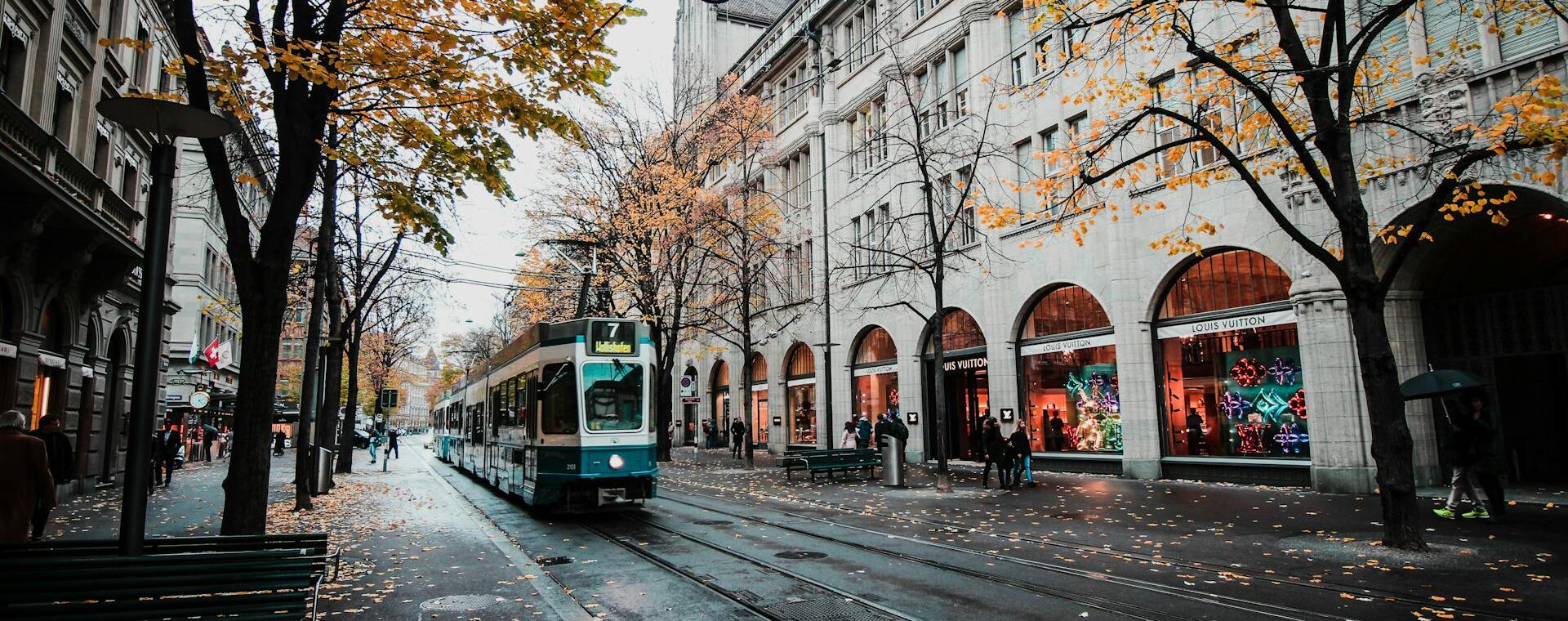Have you ever needed a holiday from your holiday? Although a holiday should be a time to recharge and relax, navigating a completely new environment can quickly become stressful. From overcrowded tourist hotspots to confusing public transport, we’ve considered 31 indicators of anxiety and analyzed 97,409 reviews of tourist attractions in the 100 most travelled to cities.
Considering the percentage of all reviews that indicate anxiety, we can reveal the most – and least – anxiety-inducing holiday destinations.
Key findings:
- Tokyo, Japan, is the world’s most anxiety-inducing tourist destination; one in four (25.2%) reviews for the top attractions in the city mention words related to anxiety
- Two more Japanese cities complete the top three most anxious cities: Osaka (21.6% of reviews) and Kyoto (21.5% of reviews)
- London, England, and Shanghai, China, complete the top five most anxiety-inducing cities (with 17.7% and 16.7% of reviews respectively)
- Tallinn, Estonia is the most relaxing destination in the study (only 1.6% of reviews were flagged for anxiety)
- The next best destinations to relax were Zhuai, Guilin, and Guangzhou – all in China
The most anxiety-inducing tourist destinations
Of the reviews analysed in our study, one in ten (9.6%) highlighted anxiety and stress, with the most stressful cities reaching as high as 25.2% of total reviews, down to the least, which exhibited 1.6% in comparison. The main cause of anxiety on holiday is overcrowding, as the most frequent keywords found in the study were ‘crowds’, ‘busy’, and ‘overwhelm’ respectively. Unfortunately, it seems that many of the popular destinations are victims of their own success.
And Japan appears to be its worst victim. Tokyo, Osaka, and Kyoto are the top three most anxiety-inducing destinations in the study. Japan witnessed a travel boom in the past decade. The country had 6.2 million international visitor arrivals in 2011 but in 2023 recorded 25.1 million. However, how well is the country facilitated for this dramatic influx of tourists?
- Tokyo, Japan
Tokyo tops the list as one in four (25.2%) reviews mentioned words and phrases related to anxiety. Tokyo is the largest city in the world and home to 13,515,271 people. It’s perhaps unsurprising that 60% of the anxiety indicators mentioned feeling crowded.
But for some people, the intensity of Tokyo is part of its appeal. The Shibuya Crossing is the busiest interaction in the world, and people flock to the crossing to experience the rush. However, not all tourists realise what they’ve signed up for. One reviewer left a two-star review complaining that there were “too many people”.
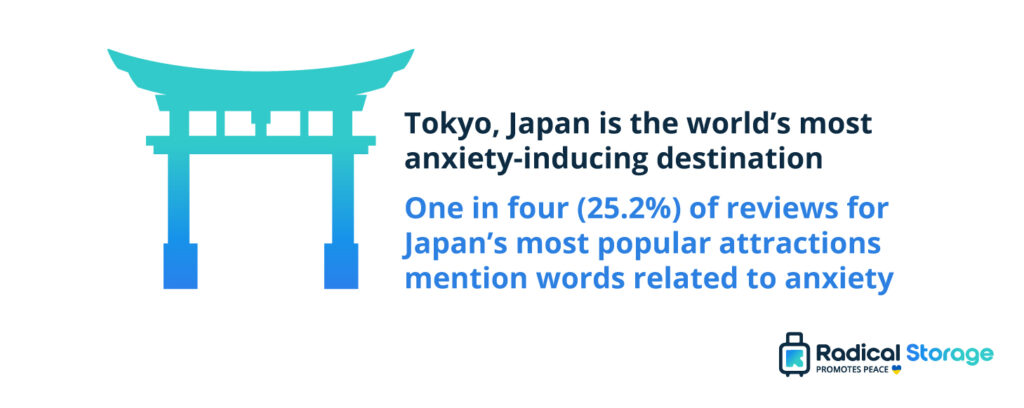
- Osaka, Japan
Osaka, the third most populous city in Japan, came second overall with one in five reviews (21.6%) mentioning an anxious indicator. Besides its famous food scene and castle, another popular tourist attraction in the city is its Universal Studios theme park – the first to open outside the United States. However, many visitors to the theme park mentioned crowds or overcrowding. One said it was so overcrowded, that staying in bed would have been a better tourist activity. Another visitor said they were left in tears by their visit.
- Kyoto, Japan
Completing the top three is Kyoto – with 21.5% of all reviews in the study being anxiety-related.
The city is home to picturesque temples, shrines, palaces, and gardens – which should all make the city a peaceful paradise. However, Kyoto appears to have become a victim of its own success. The historic town is overrun with tourists, one tourist described navigating through the traditional Geisha district of Gion as ‘torture’, and another titled their visit to the food markets at Nishiki Market Shopping District as ‘What market? All I saw was crowds.’
- London, England
After Istanbul, London was the most visited city in 2023 counting more than 18,800,000 arrivals in one year. It’s perhaps not surprising then that London is frequently described as ‘busy’. One visitor to the British Museum described their visit as ‘stressful right from the entrance’ and another visitor to Borough Market said it was so crowded they felt ‘crushed’. For peace of mind, check out our guides on transport and accommodation in London before you make your trip.
- Shanghai, China
Famous for its futuristic-looking skyline, Shanghai’s fast pace can be overwhelming. Besides a visit to the Bund Tower, another popular tourist activity in Shanghai is to take a walk down Nanjing Road which is one of the world’s busiest shopping streets. One reviewer warns not to travel with elderly relatives or kids, or else you’ll be ‘stressed out your mind’ another said they had their ‘worst experience in China’ here.
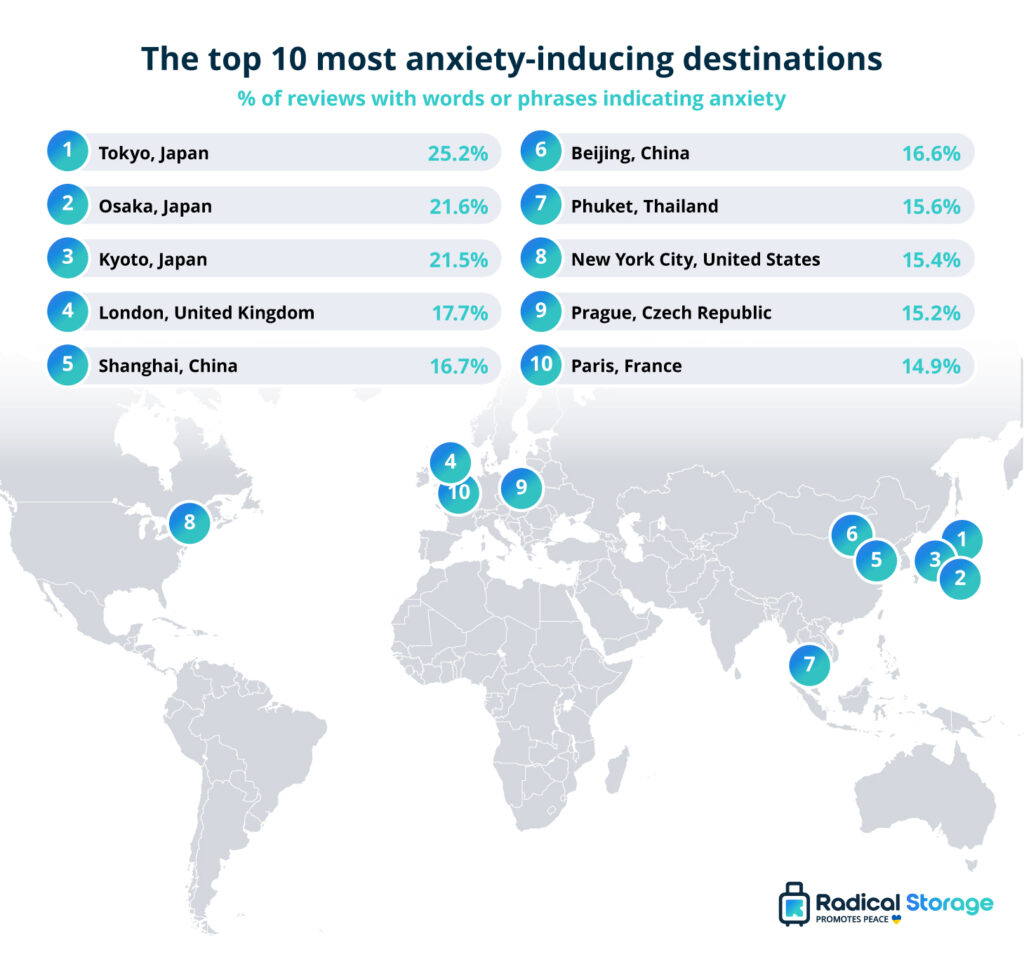
The least anxiety-inducing cities to visit
One of our studies found that three-quarters of U.S. workers (77%) are planning a vacation in 2024 to combat work stress. The following locations are the best options if you want to choose a destination to help you unwind rather than remain hyper-vigilant and on edge.
- Tallinn, Estonia
Tallinn is the capital city of Estonia, a Baltic country neighbouring Russia, and Latvia, and it may not be on your radar as a must-see holiday destination – but it should be. Not only is it one of Europe’s best-preserved mediaeval cities but it’s the most stress-free city in our study.
Glowing reviews for attractions in the city describe the atmosphere as ‘serene but vibrant’ ‘relaxing atmosphere’ and ‘a quiet city away from the tourist traps in Europe’.
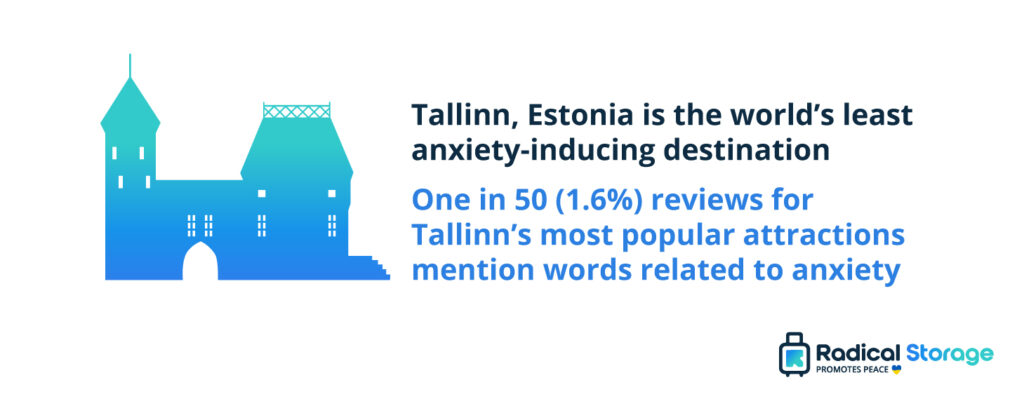
- Zhuhai, China
Three Chinese cities secured the titles of the 2nd, 3rd, and 4th least anxiety-inducing cities in the study. In China, Zhuhai is known as the ‘city for romance’ and the ‘city of a hundred islands’ as well as being China’s most liveable city. In keeping with the beachy, romantic theme, only 2% of all the reviews of Zhuhai’s 10 most popular attractions were flagged for anxiety.
Reviews of the main attractions in the Chinese Riviera mention the peacefulness of the Zhuhai Lovers’ Road and the peacefulness and serene views at the mountain top by the Yuan Ming Palace.
- Guilin, China, and Guangzhou, China
Joint third are the Southern Chinese cities of Guilin and Guangzhou.
Guilin – famous for its avatar-style mountains – is perfect if you are looking for an urban base with access to superb nature. Tourists to the Riyue Shuangta Cultural Park mention the ‘relaxing atmosphere’ and the Guilin Two Rivers and Four Lakes Resort cruise as ‘relaxing’ with mention of flautists and dance shows lining the river banks.
Guangzhou has earned the name ‘City of Flowers’ as the subtropical city has flowers blooming all year round. If you are looking for peace in Guangzhou head to Shamian Island which reviewers describe as ‘quiet’ and great for a ‘relaxing chill’.
5. Vilnius, Lithuania
Another Baltic city completes the top five: Vilnius. Popular with Polish and Belarusian tourists, Vilnius also offers one of Europe’s largest surviving Mediaeval quarters.
Visitors looking for a peaceful getaway in Vilnius can expect to find ‘cozy places to eat’ in the ‘dreamy’ Old Town and the ‘calming environment’ surrounding the Gate of Dawn, a Christian place of pilgrimage.
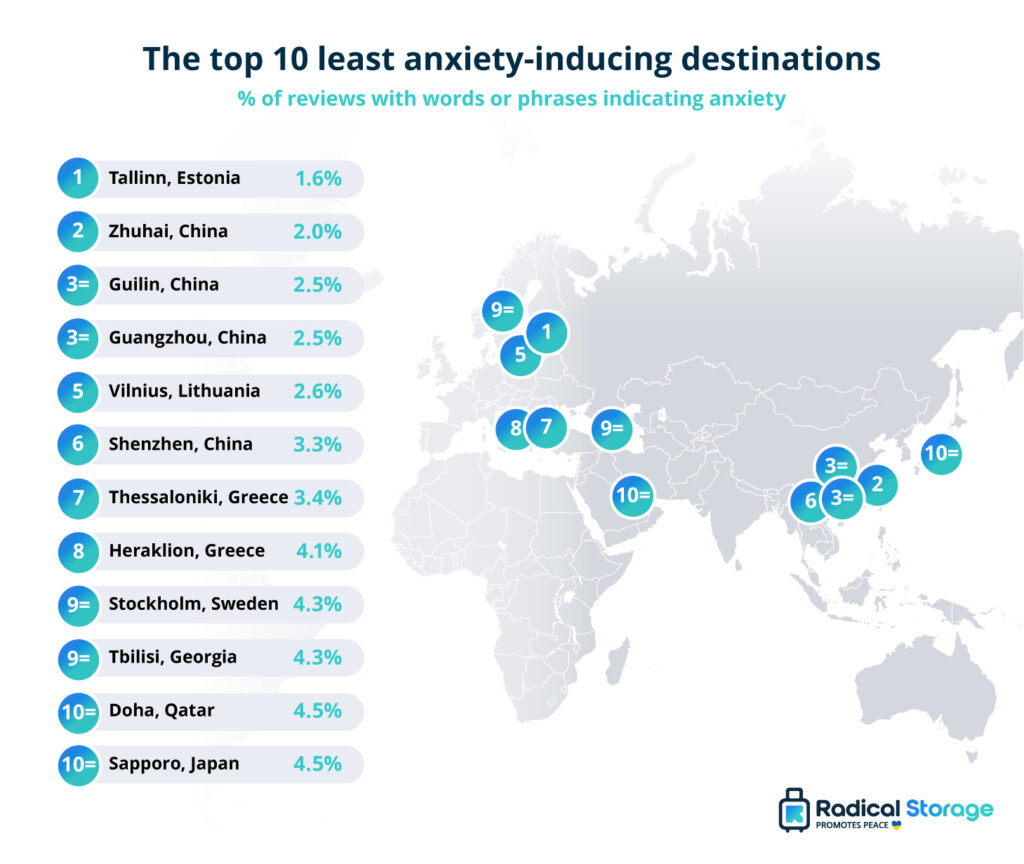
Methodology
All data was collected in September 2024. We selected the 100 cities from Euromonitor’s 2023 Top 100 City Destinations Index list. This report compares 55 metrics across six key pillars for 100 city destinations, to create an overall city attractiveness score. The six key pillars include: (1) economic and business performance, (2) tourism performance, (3) tourism infrastructure, (4) tourism policy and attractiveness, (5) health and safety, and (6) sustainability.
For each city, we identified “Things to Do in X”, including popular landmarks and tourist attractions, based on visitor numbers and cultural significance. From these locations, we collected reviews, resulting in a total of 97,409 reviews.
Any city with less than 400 reviews for the top 10 tourist attractions in the city were discounted from the list.
The reviews were then analysed using a custom-built algorithm designed to detect specific anxiety-related keywords. To ensure the accuracy of the analysis, false positives were deducted, for example, distinguishing between words like “traffic” and phrases such as “not much traffic” or “no traffic.” Words with * denote stem words where relevant suffixes were also counted, e.g. overwhelm would also include overwhelming and overwhelmed.
Additionally, false negative keywords were removed to further refine the keyword list, allowing us to measure the presence of anxiety-related sentiments in the reviews across these cities and locations. Finally, we calculated the percentage of reviews containing anxiety-related keywords for each city, allowing us to compare anxiety levels across different cities and attractions.
Keywords:
- Crowded
- Busy
- Traffic
- Overwhelm*
- Worry
- Not crowded
- Noise*
- Pressure
- Stress*
- Exhaust*
- Rushed
- Chaotic
- Disturb*
- Uncomfortable
- Fear
- Fear
- Tense
- Tiring
- Claustrophobic*
- Unsafe
- Not Busy
- Hectic
- Frustrating
- Nervous
- Unpredictable
- Panic
- Difficult to navigate
- Anxious
- Anxiety
- Uneasy
- Apprehensive
- Restless
- Irritating
- No traffic
- Not hectic

This work is licensed under a Creative Commons Attribution-ShareAlike 4.0 International License.

